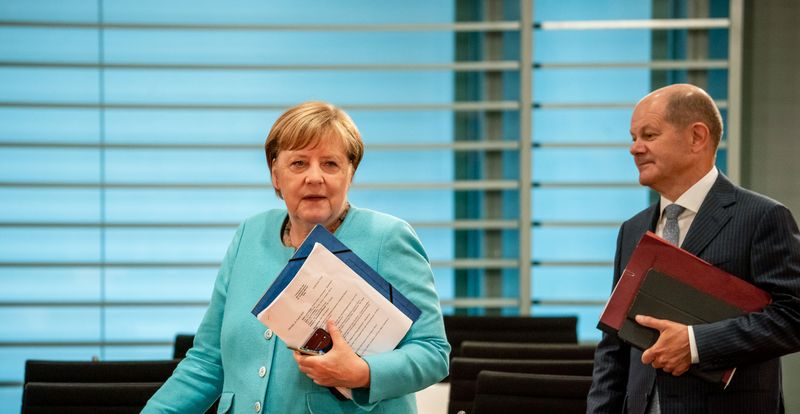BERLIN (Reuters) – German Finance Minister Olaf Scholz has drawn criticism from Chancellor Angela Merkel’s conservatives with his proposal to suspend the constitutionally enshrined debt brake in 2021 after abandoning it this year due to the coronavirus pandemic.
Scholz asked parliament in June to suspend the debt brake and allow record new borrowing of 217.8 billion euros ($258.14 billion) as Berlin tries to help companies and consumers recover more quickly from the COVID-19 pandemic.
Scholz, chancellor candidate for his centre-left Social Democrats in next year’s federal election, said at an SPD event in Berlin late on Wednesday that the government would have to abandon the debt brake in 2021, too.
The move indicates he is trying to permanently move Germany away from its image as Europe’s austerity champion and become one of the euro zone’s biggest spenders before the election.
But his proposal sparked fierce criticism from Merkel’s chief budget lawmaker Eckhardt Rehberg.
“Suspending the debt brake must not become a habit. We have to get back to the regular debt limit as quickly as possible,” Rehberg told Reuters on Thursday.
There was still no agreement in the coalition on whether the government should ask parliament to suspend the debt brake again in 2021 and allow higher spending, he said.
“It’s the Bundestag that will pass the budget for 2021 in December, not the finance minister in August,” Rehberg said, pointing to signs the economy was recovering and tax revenues developing better than expected.
He made clear, however, that Merkel’s CDU/CSU bloc doesn’t want to unleash an austerity program in an election year.
“With such a statement, the chancellor candidate is opening the race for additional spending,” said Otto Fricke, chief budget lawmaker from the opposition pro-business Free Democrats.
(Reporting by Michael Nienaber; Editing by Michelle Martin and Madeline Chambers)






















